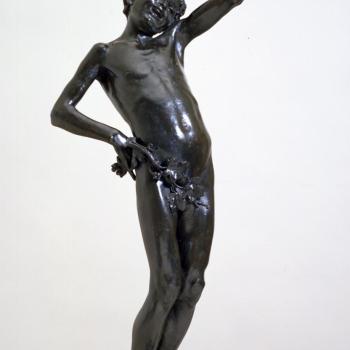
A follow up to my article “There’s something queer about Andrew Tate” published in The American Spectator
“Liberal institutions cease to be liberal as soon as they are attained: later on, there are no worse and no more thorough injurers of freedom than liberal institutions. Their effects are known well enough: they undermine the will to power; they level mountain and valley, and call that morality; they make men small, cowardly, and hedonistic — every time it is the herd animal that triumphs with them. Liberalism: in other words, herd-animalization.
On closer inspection it is war that produces these effects, the war for liberal institutions, which, as a war, permits illiberal instincts to continue. And war educates for freedom. For what is freedom? That one has the will to assume responsibility for oneself. That one maintains the distance which separates us. That one becomes more indifferent to difficulties, hardships, privation, even to life itself. That one is prepared to sacrifice human beings for one’s cause, not excluding oneself. Freedom means that the manly instincts which delight in war and victory dominate over other instincts, for example, over those of “pleasure.”
The human being who has become free spits on the contemptible type of well-being dreamed of by shopkeepers, Christians, cows, females, Englishmen, and other democrats. The free man is a warrior. How is freedom measured in individuals and peoples? According to the resistance which must be overcome, according to the exertion required, to remain on top.”
*This is actually not a quote from one of Andrew Tate’s latest viral videos. It’s from Friedrich Nietzsche’s 1889 book The Twilight of the Idols. I noted in my Hot Takes Vol. 2 that some of Tate’s emphasis on strength and personal responsibility has strong Nietzschean undertones. It’s also worth noting the Kantian/neo-Stoic vibe of his harping about fulfilling one’s duty. There’s more to be said about the way his newfound Muslim faith has shaped his comments about the nature of God and gender relations.
*His sense that Christianity is a religion for the lukewarm, the soft and weak sounds like things Nietzsche has said about Christians. And though Nietzsche hadn’t written much on Islam, I’m sure he would agree with Tate’s reading of the Muslim God as one that demands zeal, discipline, and when necessary, violence. Interesting how the Christian belief in the Incarnation and in charity as the highest of virtues is so incomprehensible to both the mainstream left and right.
*Though I criticize Peterson in my article as being a whiny soyboy, I of course distinguish him from Tate. And as much as I think Peterson is overly ideological, polemical, and presents his ideas (most of which I think are valid) in a vacuum, he stands for a more honorable and charitable vision of masculinity, unlike Tate’s narcissistic, self-indulgent vision. Yet neither of them present masculinity in what I would consider it to be its fullness: a mode of generativity, “heroic” virtues not lived out for the sake of duty or maintaining order, but ordered toward charity, loving self-gift, and ultimately as a response to the call of God.
*As I’ve said before, making one’s bed every morning for the sake of taking responsibility for oneself and fulfilling one’s duties is much more boring than making one’s bed as a response to recognizing the day is a gift from God, and desiring to begin their day with beauty, with an act of love. Of course, I understand that charity is a supernatural virtue that one cannot reach without the stepping stone of natural virtue. Grace builds on nature, thus why I understand young guys drawn to Peterson who have no virtuous male role models to look up to. So while I respect guys learning natural virtue from Peterson, it is my hope that they discover that these virtues are not ends in themselves.
*If Peterson represents natural (or noble pagan) virtue which can become the building blocks of supernatural virtue (as did Aristotle’s philosophy for Aquinas), Tate represents the debauched pagan, the prelapsarian man, who in the least possesses the raw material (strength, desire) which through discipline can channel his disordered drives toward (naturally) virtuous ends. In the same way supernatural virtue builds on natural ones, natural virtue builds with the raw material of base human instincts (as sinful as they may be).
*As Peterson himself has said, “you don’t make men safe by making them weak. In fact they are much more dangerous when they’re weak because they’ll stab you in the back or take advantage of you when they get the chance. You make men safe by making them strong, and then by making sure they are disciplined. It’s men who are the most aggressive and fearless temperaments who can be the best men.” (Again, safety is not an end in itself, but you get my point).
*The gnostic impulse to create good, loving men without first engaging the raw material of base instinct and then forming it into natural virtue (and then the supernatural ideal of love…and I should clarify that love in the Christian sense is different from what bourgeois secularists mean by love, which is more akin to benevolence or good will) renders men tame and “well-behaved” but utterly vapid and neutered. Those who despise figures like Peterson and Tate are naive to think that people can skip those primary steps, and give into a moralistic mentality that fears any association with anything that isn’t completely morally pure.
*On that note, the kind of “locker room talk” Tate engages in is morally repulsive, but I understand why young men like hearing him talk that way. No respectable person should advocate speaking the way Tate does about women. But the reality is, we as humans are not always respectable. Sometimes we are immature, we sin…especially when we’re younger.
*It’s one thing to engage in inappropriate behavior (and use foul language) in moments when we feel uninhibited or morally weak, and are behind closed doors, and then to look back at that moment with remorse and attempt to amend one’s ways (and for those who are Christian, to go to confession). It’s another to publicly use such language and act as if there’s nothing wrong with it, just as it’s another thing to demonize the use of such language wholesale (again, the puritanical impulse). We all sin, and we shouldn’t do it–especially not in public. But as much as we deserve correction in our moments of moral laxity, we shouldn’t be demonized for it. American’s would be much better off if they went to confession regularly.
$upport CracksInPomo by choosing a paid subscription of this page, or by offering a donation through Anchor. Check out my podcast on Anchor and YouTube and follow me on Instagram and Twitter.
photo courtesy of CNN












